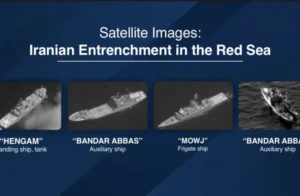Benny Gantz: “The presence of Iran’s military forces in the Red Sea in recent months is the most significant in a decade.”

Israel’s Defense Minister Benny Gantz revealed recent satellite images showing four Iranian military ships in the Read Sea while at the Annual Economist Government Roundtable in Greece.
“Iran is expanding its aggressive operations in the region in general, and in the naval arena in particular,” Gantz said, adding that it’s been “unusually” patrolling the Red Sea with its military ships.
“In the satellite images that I show here, you can see four Iranian military ships in the Red Sea. The presence of Iran’s military forces in the Red Sea in recent months is the most significant in a decade. It is a direct threat to trade, energy and the global economy.”
“In the satellite images that I show here, you can see four Iranian military ships in the Red Sea. The presence of Iran’s military forces in the Red Sea in recent months is the most significant in a decade. It is a direct threat to trade, energy and the global economy.”
Defense Minister Benny Gantz
The ships that Gantz showed were the Hengam landing ship, two different Bandar Abbas auxiliary ships and the Mowj frigate.
Iran has been working to upgrade its navy, with new vessels and submarines introduced to bolster the country’s aging fleet. The Islamic Republic has regularly harassed and attacked international shipping tankers, including oil tankers.
“Iran is a prime example of a widespread regional and global threat: it recently conducted an experiment in Semnan province with a satellite launcher, whose technology could be used to develop a long-range intercontinental missile with a range of thousands of kilometers that could also threaten Central Europe,” Gantz said.
The Islamic Republic, which has one of the biggest missile programs in the region, possesses thousands of short- and medium-range ballistic missiles, as well as long-range domestically-made missiles that they claim have a range of up to 2,000 kilometers. In February, it unveiled a new surface-to-surface missile with a range of 1,450 kilometers called the Kheibar Shekan.
Last week Iran carried out the second test of the Zuljanah satellite launcher. Israel and the United States have repeatedly warned against Iran’s missile program, claiming that the missiles tested by Tehran are capable of carrying nuclear warheads.
The defense minister added: “Iran’s recent experiment with a satellite launcher whose technology can help develop a terrestrial missile with a range of thousands of kilometers – could also threaten Central Europe.”
In face of Iran’s continued development of long-range missiles, Israel has been working to develop several missile defense systems, including the Arrow 3 which is one of the joint programs between Israel and the United States, was co-managed by the US Missile Defense Agency and IMDO, a division of the Israeli Defense Ministry.
Regarding Hezbollah, Gantz said that the Israeli Navy and air force intercepted three UAVs launched from Lebanon towards the Karish gas rig in Israel’s territorial water “in order to disrupt the negotiations that are taking place on the maritime border between Israel and Lebanon.”
“That was primarily against Lebanese citizens. Hezbollah’s actions, which have no operational scope, have the potential to lead to a miscalculation and to destabilization. Hezbollah’s experience shows that they do not see the reality in the region correctly,” he said, warning that Israel will act to defend its citizens and interests.
“At the same time, we are ready to work together with partners and build stability and prosperity in the area,” he added.
Israel, Greece, Cyprus defense ministers meet
Earlier in the day, Gantz met with his Greek and Cypriot counterparts on the sidelines of the conference.
During his discussion with Cyprus’s Defense Minister Charalambos Petrides “covered challenges of mutual interest in the East-Med and areas of cooperation that are critical for the security of our citizens and for the peace and stability in the region.”
With Greece’s Defense Minister Nikolaos Panagiotopoulos, Gantz said that the two discussed “increasing cooperation between the [countries’] military industries, and additional challenges we are facing, first and foremost the Iranian threat.”
